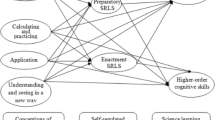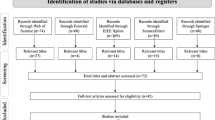Abstract
The aim of this study was to explore Taiwanese college students’ conceptions of and approaches to learning computer science and then explore the relationships between the two. Two surveys, Conceptions of Learning Computer Science (COLCS) and Approaches to Learning Computer Science (ALCS), were administered to 421 college students majoring in computer science-related departments in Taiwan. The COLCS survey included the following seven factors, in a hierarchical order: learning computer science as “Memorizing,” “Testing,” “Calculating and practicing,” “Programming,” “Increasing one’s knowledge,” “Application and understanding,” and “Seeing in a new way.” Particularly, differing from previous learning conception studies, one newly developed factor, “Programming,” was added to COLCS to incorporate this unique feature for computer science students. The ALCS survey consisted of four factors: “Surface motive,” “Surface strategy,” “Deep motive,” and “Deep strategy.” The results showed that these two surveys were deemed to be sufficiently reliable for assessing students’ conceptions of and approaches to learning computer science. It was also found that the “Programming” factor should be considered as a higher-level learning conception, similar to the other higher-level conceptions in COLCS such as “Increase one’s knowledge,” “Application and understanding,” and “Seeing in a new way.” Furthermore, the “Application” and “Understanding” factors were merged into a single factor, “Application and understanding,” in this study. However, it was indicated that both Taiwanese college students’ lower- and higher-level learning conceptions were positively correlated to their surface motivations to learn computer science.
Similar content being viewed by others
References
Antonis, K., Daradoumis, T., Papadakis, S., & Simos, C. (2011). Evaluation of the effectiveness of a web-based learning design for adult computer science courses. IEEE Transactions on Education, 54, 374–380.
Biggs, J. (1994). Approaches to learning: Nature and measurement of. In T. Husen & T. N. Postlethwaite (Eds.), The international encyclopedia of education (2nd ed., Vol. 1, pp. 319–322). Oxford: Pergamon.
Biggs, J. (2001). Enhancing learning: Amatter of style or approach? In R. J. Stemberg & L. F. Zhang (Eds.), Perspectives on thinking, learning, and cognitive styles (pp. 73–102). Mahwah: Lawrence Erlbaum Associates.
Bush, M. E. (2004). Computer science education in Japan. Communications of the ACM, 47, 23–26.
Chin, C., & Brown, D. E. (2000). Learning in science: A comparison of deep and surface approaches. Journal of Research in Science Teaching, 37, 109–138.
Chiou, G.-L., & Liang, J.-C. (2012). Exploring the structure of science self-efficacy: A model built on high school students’ conceptions of learning and approaches to learning in science. Asia-Pacific Education Researcher, 21, 83–91.
Chiou, G. L., Liang, J. C., & Tsai, C. C. (2012). Undergraduate students’ conceptions of and approaches to learning in biology: A study of their structural models and gender differences. International Journal of Science Education, 34, 167–195.
Cuny, J. (2011). Transforming computer science education in high schools. Computer, 44, 107–109.
Dart, B. C., Burnett, P. C., Purdie, N., Boulton-Lewis, G., Campell, J., & Smith, D. (2000). Students’ conceptions of learning, the classroom environment, and approaches to learning. Journal of Educational Research, 93, 262–270.
Fan, T.-S., & Li, Y.-C. (2005). Gender issues and computers: College computer science education in Taiwan. Computers & Education, 44, 285–300.
Kember, D., Biggs, J., & Leung, D. Y. P. (2004). Examining the multidimensionality of approaches to learning through the development of a revised version of the learning process questionnaire. British Journal of Educational Psychology, 74, 261–280.
Kizilgunes, B., Tekkaya, C., & Sungur, S. (2009). Modeling the relations among students’ epistemological beliefs, motivations, learning approach, and achievement. The Journal of Educational Research, 102, 243–255.
Lee, M.-H., Johanson, R.-E., & Tsai, C.-C. (2008). Exploring Taiwanese high school students’ conceptions of and approaches to learning science through a structural equation modeling analysis. Science Education, 92, 191–220.
Liang, J.-C., Lee, M.-H., & Tsai, C.-C. (2010). The relations between scientific epistemological beliefs and approaches to learning science among science-major undergraduates in Taiwan. Asia-Pacific Education Researcher, 19, 43–59.
Liang, J.-C., & Tsai, C.-C. (2010). Relational analysis of college science-major students’ epistemological beliefs toward science and conceptions of learning science. International Journal of Science Education, 32, 2273–2289.
Lin, C.-L., Liang, J.-C., Su, Y.-C., & Tsai, C.-C. (2013). Exploring the relationships between self-efficacy and preference for teacher authority among computer science majors. Journal of Educational Computing Research, 49(2), 189–207.
Lin, Y.-C., Liang, J.-C., & Tsai, C.-C. (2012a). The relationships between epistemic beliefs in biology and approaches to learning biology among biology-major university students in Taiwan. Journal of Science Education and Technology, 21, 796–807.
Lin, Y.-H., Liang, J.-C., & Tsai, C.-C. (2012b). The effects of different forms of physiology instruction on the development of students’ conceptions of and approaches to science learning. Advances in Physiology Education, 36, 42–47.
Logan, J. R., & Price, S. L. (2004). Computer science education for medical informaticians. International Journal of Medical Informatics, 73, 139–144.
Machanick, P. (2003). Principles versus artifacts in computer science curriculum design. Computers & Education, 41, 191–201.
Martinez-Fernandez, J. R. (2007). Conception of learning and metacognitive strategies in psychology undergraduates. Anales de Psicologia, 23, 7–16.
Marton, F. M., & Säljö, R. (2005). Approaches to learning. In F. M. Marton, D. Hounsell, & N. J. Entwistle (Eds.), The experience of learning: Implications for teaching and studying in higher education (3rd ed., pp. 106–125). Edinburgh: Centre for Teaching, Learning and Assessment, University of Edinburgh.
Pérez-Marín, D., & Pascual-Nieto, I. (2012). A case study on the use of blended learning to encourage computer science students to study. Journal of Science Education and Technology, 21, 74–82.
Peterson, E. R., Brown, G. T. L., & ILrving, S. E. (2010). Secondary school students’ conceptions of learning and their relationship to achievement. Learning and Individual Differences, 20, 167–176.
Ramsden, P. (1992). Learning to teach in higher education. New York: Routledge.
Roberts, F. S. (2011). The challenges of multidisciplinary education in computer science. Journal of Computer Science and Technology, 26, 636–642.
Säljö, R. (1979). Learning in the learner’s perspective I: Some commonsense conceptions. Gothenburg: Institute of Education, University of Gothenburg.
Sheard, J., Carbone, A., & Hurst, A. J. (2010). Student engagement in first year of an ICT degree: Staff and student perceptions. Computer Science Education, 20, 1–16.
Shell, D. F., & Soh, L. K. (2013). Profiles of motivated self-regulation in college computer science courses: Differences in major versus required non-major courses. Journal of Science Education and Technology, 22(6), 899–913.
Tsai, C.-C. (2004). Conceptions of learning science among high school students in Taiwan: A phenomenographic analysis. International Journal of Science Education, 26, 1733–1750.
Tsai, C.-C., Ho, H.-N., Liang, J.-C., & Lin, H.-M. (2011a). Scientific epistemic beliefs, conceptions of learning science and self-efficacy of learning science among high school students. Learning and Instruction, 21, 757–769.
Tsai, W.-T., Li, W., Elson, J., & Chen, Y. (2011b). Collaborative learning using wiki web sites for computer science undergraduate education: A case study. IEEE Transactions on Education, 54, 114–124.
Verginis, I., Gogoulou, A., Gouli, E., Boubouka, M., & Grigoriadou, M. (2011). Enhancing learning in introductory computer science courses through SCALE: An empirical study. IEEE Transactions on Education, 54, 1–13.
Author information
Authors and Affiliations
Corresponding authors
Rights and permissions
About this article
Cite this article
Liang, JC., Su, YC. & Tsai, CC. The Assessment of Taiwanese College Students’ Conceptions of and Approaches to Learning Computer Science and Their Relationships. Asia-Pacific Edu Res 24, 557–567 (2015). https://doi.org/10.1007/s40299-014-0201-6
Published:
Issue Date:
DOI: https://doi.org/10.1007/s40299-014-0201-6




